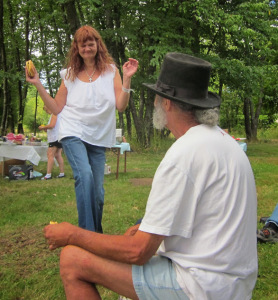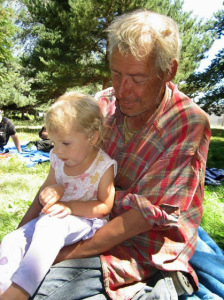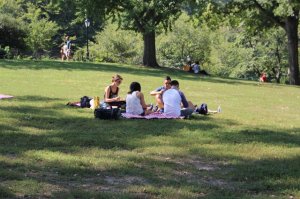-
Discarded Bottle
 This is the first morning I awoke in my new community. I am in the process of moving from Portland Oregon to Eugene Oregon, to be pastor in a new congregation. I’m nervous, because for the last twenty years I’ve been the pastor of a homeless congregation with middle class people in it and now I am a pastor of a middle class congregation that will (hopefully) have homeless folks in it. Class shift is difficult and takes time. I hope this congregation will be patient with me as I make the transition.
This is the first morning I awoke in my new community. I am in the process of moving from Portland Oregon to Eugene Oregon, to be pastor in a new congregation. I’m nervous, because for the last twenty years I’ve been the pastor of a homeless congregation with middle class people in it and now I am a pastor of a middle class congregation that will (hopefully) have homeless folks in it. Class shift is difficult and takes time. I hope this congregation will be patient with me as I make the transition.Meanwhile, I am a minister in a new city. I am supposed to minister. But how do I start? I start this morning by walking.
I walked a mile around the apartment I am temporarily staying in. It is early Sunday morning, so the streets are pretty much empty of souls, just the way I like it. But it is a good time to begin ministering. How does one do this?
I need to see the city for what it is. This is not just a “little Portland” or a community that I can treat the same as my old one. I have to look carefully to see what the city really is. At times I will do this by comparison/contrast to the city I lived in for thirty years. But I also just need to look at it. Look at the butte (hey now, don’t misread), look at the traffic, look at the vegetation, look at the… ah, the trash. Some things don’t change.
If I am going to minister to a person, I need to hear clearly what they are telling me. Who are they, what are their passions, what are their concerns? As I walk, I am passing a woman with headphones walking the opposite way. She moves away from me and looks to the ground. Perhaps she isn’t feeling social. Or perhaps she is nervous about the older white guy walking opposite to her. I look away and give her the space she requires. Sometimes staying away is the best way of serving another.
In my walk I saw an empty bottle in the middle of the street. I picked it up, figuring I could place it in recycling when I get back to the apartment. Then I noticed an empty bag. Ah ha. So I picked up the bag and as I went on I slowly began filling it with trash. It was about half full when I came back to my residence and I dropped it in the trash, putting the recycling in its proper place. I have fed thousands of people before, but this morning my best act of love was picking up trash. That’s enough.
The most important thing is to remember that I am not here to change this city, to change this congregation or to change this or that person. I do not know what I can do. This new path is a blank slate to me and I cannot impose my ideals or hopes onto it. It is time for the path to lead me. I am not just going to fit in a place that someone else has dictated to me. But I am going to wait for God to show me my place. That will probably stir up some dust, because that is what happens when God acts. In the meantime, it is just me. I need to stand aside and observe the bold actions, the coping mechanisms, the open wounds and the ill-fitting bandages. And then, eventually, I pray and seek my place.
-
Say Their Names
 Kristle Delihanty is an outreach worker, providing food and care for folks on the street in SE Portland. This is a story she shared:
Kristle Delihanty is an outreach worker, providing food and care for folks on the street in SE Portland. This is a story she shared:Two Fridays ago.. I jumped out of my Jeep and skipped up the curb into the park, after a long haired sweet gal that I have made friends with.
I shouted “Alison!”
She turned quickly with a smile, her hair flipped against the back drop of greenery and path.
And she said “Do you know how long its been since someone has said my name?”
Her entire body soften and her face light up like flowers in the sun, as she walked toward us.
She continued.. “I lose myself out here.. I forget my identity. My name. Who I was.”
I threw my arms around her and said “lets eat!”
What she doesn’t know is the moment I found out her name, she went in a book of prayers and me and Jesus.. We say her name nightly.
Say their names until they are free.
-
Welcoming the Stranger: A Practical Guide
 It’s easy to find verses about welcoming the homeless.
It’s easy to find verses about welcoming the homeless.It was common practice in the ancient Mediterranean World to invite strangers into their home and to welcome immigrants to live on a property.
Jesus said that to welcome on of the “least of these” into our home is to be welcoming him.
Hebrews, John and James all recommend taking in people without a home and “show hospitality” which means letting them stay overnight for at least one night.
And frankly, the homelessness crisis has grown to such an extent in some of our communities, that having people stay in homes with empty rooms is a reasonable and possibly necessary solution.
But we have heard stories and we have fears. A local woman invited a homeless man to stay overnight in her apartment and she ended up dying in the encounter. Other people have had items stolen from them. To invite someone into your home to sleep is being vulnerable to them. There is certainly a need to be careful and we should avoid naivety. “Be as wise as a serpent and as gentle as a dove.”
My wife and I have had more than 60 houseless guests stay with us over thirty years, both when we had children in the house and when we did not. Some for a day, some for ten years. We have retained a balance between mercy and caution in this endeavor. We saw it as a necessary act of our faith, but not a reckless one.
Taking precautions
I have learned not to let anyone in our house to stay overnight whom we didn’t know or who had a reference from someone we knew and trusted. This offers an indication as to whether a person is safe. I usually did this by talking and working on common projects with people who live on the street. Sometimes we had people over for a night or two because they came recommended by people we knew.
Before we had this rule, people staying over wasn’t always good. We have had people steal things from my home and I had people use drugs in my home. One time we welcomed a woman and her son who would prance around my living room in the nude and turn the heat up to 85 degrees. These were all people I didn’t know and so had no expectations as to what they would do in my home. One I made the rule that I had to understand what a person was like before inviting them in, these bad situations dropped to almost nothing.
I took in a couple who had written references from two churches from other towns. They were travelling through, and they needed a place to crash so we let them stay in our living room. In the end, we found out that the man was a habitual liar and was abusive to his wife. At the end of their stay, his reputation was ruined and she left him to go live with her parents. She is doing well. But this taught me that a reference from an unknown entity is worthless.
I do not recommend a single person welcoming an unknown stranger into their home if they live alone. People adjust under social pressure, and that cannot be applied as a lone person. But two or more can uphold the standards of the home and make sure that a person who becomes unwelcome can be told to leave.
If you are thinking about having someone stay for a longer time (more than a week), then you might want to establish a trial period to see if the guest fits into your community.
Establishing boundaries
When a person comes to stay for you, have a list of rules ready. The actual list is up to you, but I would recommend that it include:
What they are welcome to (certain food, for instance) and what they are not (e.g., anything you keep in your bathroom).
-Where they can have privacy and where you don’t want them to go. (Please be sure to give them some space for privacy, if at all possible).
-Smoking, alcohol and drug use should be discussed (Our policy was smoking outside was okay, but alcohol or pot use had to be used off of our property. Illegal drug use was grounds for leaving.)
-What you want as payment for their stay (For longer term guests [more than a week], we asked that they work ten hours a week for us or our work among the homeless).
-Let them know about inviting guests over (e.g., all guests have to be gone by 11pm).
-Any specific issues that is unique for your specific household
Also let them know what is grounds for immediate leaving (e.g., any violent act, theft, disturbing the neighbors, use of drugs on the property).
This may be hard to go over with someone you basically trust, but if you have these rules written down or typed up, it will feel less personal, and just something that everyone has to agree to.
What to Expect
-A very grateful person, willing to do whatever is in their power to help.-Someone who will forget the most important things you mentioned, even if they verbally agreed to them. Expect to have to remind them a few times about some of the rules that is counter to their normal way of doing things. (Like bringing dishes to the sink and rinsing them. I’m still reminding people about this!)
-Someone who will sleep longer than you think is good. A person under chronic stress when they are finally safe usually has a wave of depression that hits them.
-Someone who will be discovering ailments they didn’t know they had until they got inside (diabetes, liver problems, chronic pain, and/or bone or skin injuries, for example).
-Someone who isn’t as motivated or energetic to help you or themselves as they indicated.
-A person who has a fifty/fifty chance to escape the trauma and drama and self-inflected pain they have been living with.
-Someone who will need more encouragement and support than you originally thought.
-Being filled with emotion— at times joy, at times anger, at times anticipation, at times dread— depending on how well your guest is doing (or how you think s/he is doing).
-A change in your own attitudes and thinking. Naivety and fear will be replaced with wisdom and caution.
A fifty percent chance doesn’t seem like much for a person’s life to be changed. But it is better than a zero percent chance. Frankly, I can say that 3/4 of the people who left our home departed better than they came to it. That’s a pretty fair number, I think.
Ending the stay
When it is time for a guest to leave, make it clear what the reasons are and what time you expect them to leave. Unless the situation is dangerous, I would recommend that longer-stay guests be given more than a day to find another place to live. A few people I have had to ask to leave immediately. Short term guests I usually gave them a few days. Long term guests I usually gave thirty days. The final community we had I gave three years warning that we were closing and that everyone would have to leave. They all found places to live and jobs before the deadline.Even if we are mad at someone, we need to end their stay fairly and at peace, as much as we can on our side.
Results
Dion stayed with us for a year. After staying with us that long, his family realized that he was a safe person and they invited him to live with them. Toby, after leaving our house, stayed with his sister, even though she didn’t have anything good to say about him before.
A few of our guests passed away in our house, or in the hospital after collapsing on our property. They lived their last days in peace.
Some of our guests left of their own accord because they couldn’t live a “straight” lifestyle. Some of these returned when they were ready.
Many of our guests stayed a short time until they were able to obtain housing on their own.
Stability is an open door to living better. Yes, we take a chance every time we invite someone into our house. But I have found the results to be worth it.
-
System of Mercy, System of Judgement
Memories…
-When six police officers came to my church, handcuffed and seated ten people in the parking lot and threatened them verbally. Ten more officers came, with their lieutenant, who asked me, “Are you the pastor? Does your congregation want people like this here?” I pointed at all the people they had handcuffed and said, “They ARE my congregation.” The lieutenant turned to his officers and said, “We aren’t wanted here, let’s go” and they all released the folks and left. But not before the officer who started it all screamed at my face for “enabling these criminals.”
-The time an officer came to my church, harassing someone on my property. I calmly informed him that people who threaten others aren’t allowed on the property and he would have to stop or leave. He turned on me and said, “Sanctuary, what kind of a name is that”? I said, “It means a place that is safe for people to honor God.” “You mean safe from the authorities?” “Safe from anyone who threatens their well-being.” He huffed off.
-The time a group of officers came to move someone off of our property and they handcuffed and threatened the person in question. I told them not to threaten or harm him. An officer replied to me, “If you really want to help him, you’d send him to jail.” I replied, “Jail isn’t what he needs. He needs the freedom and opportunity to choose mercy and kindness. Jail takes away all choices, not allowing for any real change to happen.”
-
 An officer comes to our property during a winter shelter and asks if there are any problems. “No problems,” I say, “We work things out ourselves here.” “Well, if you need any help,” he says, “Be sure to call us. We are here to help you workers, not these people,” he points to houseless folk smoking beside the church.
An officer comes to our property during a winter shelter and asks if there are any problems. “No problems,” I say, “We work things out ourselves here.” “Well, if you need any help,” he says, “Be sure to call us. We are here to help you workers, not these people,” he points to houseless folk smoking beside the church.* * *
Byron, a homeless Christian I know, told me, “The church is there to show God’s mercy as an opportunity. When someone isn’t ready for mercy, then God hands them over to the authorities for judgment.
If we are helping people on the margins, we need to remember that the police are for judgement, not for justice. When we call the police, we are enacting the wrath of the world upon the one we are judging, and we may very well be taking their lives in our hands.
The police are not there to protect the margins. They are there to protect the “proper” people, the church going people, the people who sound educated and of a proper class. The people of Jesus are there to support the margins. Perhaps we should let the police do their job, away from where we do ours.
-
Picnic
 A group of friends sat down in the park to have a picnic. The sun was bright, they laid down a couple blankets, they were teasing each other. They were laughing and enjoying each other’s company. Someone had brought a Frisbee and they were passing it around. They had just bought some hamburgers and were using the barbecue to grill it. Everyone was having a great time.
A group of friends sat down in the park to have a picnic. The sun was bright, they laid down a couple blankets, they were teasing each other. They were laughing and enjoying each other’s company. Someone had brought a Frisbee and they were passing it around. They had just bought some hamburgers and were using the barbecue to grill it. Everyone was having a great time.Suddenly, the police came and told them that the dispatch had received a call complaining about them so they had to leave. When someone asked, “Why? What did we do?” The police responded, “We’ve told you before, the park isn’t for you. It’s for our citizens.”
One of the men gets bold and says, “We are citizens. We live in this neighborhood.” They are told that they don’t pay taxes, so they had to go. A woman says, “What about our food? It will be ruined if it doesn’t finish cooking.”
The police say, “That’s not our problem. You have to go. Now.” They pack up to leave.
They were homeless.
What if you couldn’t partake of every day pleasures simply because you lost your job, because you didn’t have a home. This kind of story happens to tens of thousands of people everyday. The homeless are our children, our parents, our co-workers, they go to school with our children. As a society, we need to give the homeless a place to thrive.
3733 N Williams Ave
Portland, OR 97227
503.888.4453
AnawimCC@gmail.com
Ministry Locations and Times »
Recent Posts from Anawim
-
Discarded Bottle
This... -
Say Their Names
Kristle... -
-
System of Mercy, System of Judgement
Memories…... -
-
Community House
In... -
-
-
How does Homlessness Affect the Economy?
Houseless... -










